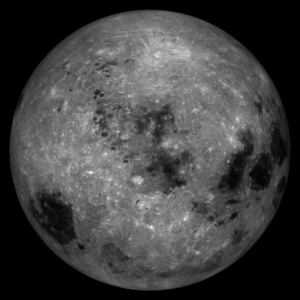Moon (Anteria): Difference between revisions
Jump to navigation
Jump to search
m (Added reference to Olesia 5) |
mNo edit summary |
||
| (2 intermediate revisions by the same user not shown) | |||
| Line 20: | Line 20: | ||
| asc_node = Regressing by one [[wikipedia:orbit|revolution]] in 18.61 years | | asc_node = Regressing by one [[wikipedia:orbit|revolution]] in 18.61 years | ||
| arg_peri = Progressing by one [[wikipedia:orbit|revolution]] in 8.85 years | | arg_peri = Progressing by one [[wikipedia:orbit|revolution]] in 8.85 years | ||
| satellite_of = [[ | | satellite_of = [[Anteria]] | ||
| flattening = {{val |0.0012}} | | flattening = {{val |0.0012}} | ||
| equatorial_radius = {{nowrap |1738.1 [[wikipedia:Kilometre|km]]{{nbsp |2}}{{smaller |<br>(0.2725 of [[Anteria]]'s)}}}} | | equatorial_radius = {{nowrap |1738.1 [[wikipedia:Kilometre|km]]{{nbsp |2}}{{smaller |<br>(0.2725 of [[Anteria]]'s)}}}} | ||
| Line 59: | Line 59: | ||
}} | }} | ||
The Moon is the only large natural satellite of the planet [[Anteria]]. It is so far the only extraterrestrial object that has been landed on by humans directly, first time with [[Olesia 5]] in 1967. | The Moon is the only large natural satellite of the planet [[Anteria]]. It is so far the only extraterrestrial object that has been landed on by humans directly, first time with [[Olesia 5]] in 1967. | ||
==Geological history== | |||
TBA | |||
==Physical characteristics== | |||
TBA | |||
==Geography== | |||
[[File:MapOfMoonAnteriaNames.png|800px|thumb|left|Map of the Moon with notable landmarks named]] | |||
TBA | |||
{{Template:Tendor system table}} | {{Template:Tendor system table}} | ||
Latest revision as of 16:54, 19 July 2022
 Full moon seen from Anteria | |||||||||||||
| Designations | |||||||||||||
|---|---|---|---|---|---|---|---|---|---|---|---|---|---|
| MPC designation | Anteria I | ||||||||||||
| Luna | |||||||||||||
| Adjectives | Lunar | ||||||||||||
| Orbital characteristics | |||||||||||||
| Epoch J2000 | |||||||||||||
| Perigee | 362,600 km (356,400 – 370,400 km) | ||||||||||||
| Apogee | 405,400 km (404,000 – 406,700 km) | ||||||||||||
| 384,399 km (1.28 ls, 0.00257 AU) | |||||||||||||
| Eccentricity | 0.0549 | ||||||||||||
| 27.321661 d (27 d 7 h 43 min 11.5 s) | |||||||||||||
| 29.530589 d (29 d 12 h 44 min 2.9 s) | |||||||||||||
Average orbital speed | 1.022 km/s | ||||||||||||
| Inclination | 5.145° to the ecliptic | ||||||||||||
| Regressing by one revolution in 18.61 years | |||||||||||||
| Progressing by one revolution in 8.85 years | |||||||||||||
| Satellite of | Anteria | ||||||||||||
| Physical characteristics | |||||||||||||
Mean radius | 1737.4 km (0.2727 of Anteria's) | ||||||||||||
Equatorial radius | 1738.1 km (0.2725 of Anteria's) | ||||||||||||
Polar radius | 1736.0 km (0.2731 of Anteria's) | ||||||||||||
| Flattening | 0.0012 | ||||||||||||
| Circumference | 10921 km (equatorial) | ||||||||||||
| 3.793 km2 (0.074 of Anteria's) | |||||||||||||
| Volume | 2.1958 km3 (0.020 of Anteria's) | ||||||||||||
| Mass | 7.342 kg (0.012300 of Anteria's) | ||||||||||||
Mean density | 3.344 g/cm3 0.606 × Anteria | ||||||||||||
| 1.62 m/s2 (0.1654 g) | |||||||||||||
| 0.3929±0.0009 | |||||||||||||
| 2.38 km/s (8600 km/h; 5300 mph) | |||||||||||||
Sidereal rotation period | 27.321661 d (synchronous) | ||||||||||||
Equatorial rotation velocity | 4.627 m/s | ||||||||||||
| |||||||||||||
North pole right ascension |
| ||||||||||||
North pole declination | 65.64° | ||||||||||||
| Albedo | 0.136 | ||||||||||||
| |||||||||||||
| |||||||||||||
| 29.3 to 34.1 arcminutes | |||||||||||||
| Atmosphere | |||||||||||||
Surface pressure | |||||||||||||
| Composition by volume | |||||||||||||
The Moon is the only large natural satellite of the planet Anteria. It is so far the only extraterrestrial object that has been landed on by humans directly, first time with Olesia 5 in 1967.
Geological history
TBA
Physical characteristics
TBA
Geography
TBA


